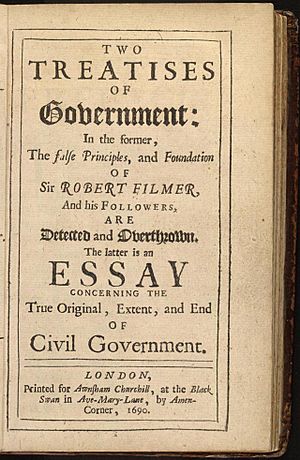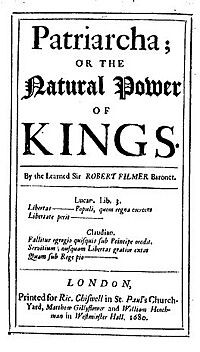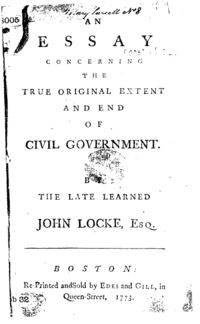Two Treatises of Government facts for kids

Title page from the first edition
|
|
| Author | John Locke |
|---|---|
| Country | England |
| Language | English |
| Series | None |
| Subject | Political philosophy, Liberalism, Classical liberalism |
| Publisher | Awnsham Churchill |
|
Publication date
|
1689 (dated 1690) |
| Media type | |
| Text | Two Treatises of Government at Wikisource |
Two Treatises of Government is a very important book about how governments should work. It was written by John Locke in 1689. The book has two main parts. The First Treatise argues against the idea that kings get their power directly from God. The Second Treatise explains Locke's own ideas for a fair society. These ideas are based on natural rights and the idea that people agree to be governed. This book is a key text in the history of liberalism, which is a way of thinking about freedom and equal rights.
Locke's ideas in this book were different from some of his earlier writings. For example, in 1660, he wrote Two Tracts on Government, which was more conservative. He never published that one. He also helped write the Fundamental Constitutions of Carolina in 1669. This document supported ideas like having a ruling class and even slavery. However, some people argue that Locke was just a secretary for that document. They say it might not have fully shown his own beliefs.
Contents
Why Locke Wrote This Book
This book was written during an important time in English history. In 1688, King James II of England was removed from power. This happened when Parliament joined forces with William of Orange from the Netherlands. William and his wife, Mary II, became the new rulers of England. This event is known as the Glorious Revolution.
Locke said that his book was written to explain why William and Mary becoming king and queen was fair. However, some experts like Peter Laslett think Locke wrote most of the book earlier, between 1679 and 1680. This was during a time called the Exclusion Crisis. During this crisis, people tried to stop James II from ever becoming king. Locke's friend and mentor, Anthony Ashley-Cooper, 1st Earl of Shaftesbury, was involved in this effort.
Other experts, like Richard Ashcraft, suggest the book might be connected to revolutionary plans around the Rye House Plot. Because his ideas were dangerous, Locke never openly said he wrote the book during his lifetime. Many people, including Locke, had to leave England because of these political events.
How the Book Was Published
Two Treatises was first published without an author's name in 1689. Locke was not happy with the first edition because it had many mistakes. He wanted to publish a better version for the rest of his life. He even corrected the third edition by hand. He died before the fourth edition came out.
Locke wrote a "Preface" for the book. In it, he said that more than half of his original writing was lost. This missing part was supposed to go between the First and Second Treatises.
In 1691, the book was translated into French. This French version left out Locke's "Preface," all of the First Treatise, and the first chapter of the Second Treatise. Famous French thinkers like Montesquieu, Voltaire, and Rousseau read this shorter version. The only American edition in the 1700s was printed in Boston in 1773. It also left out these sections.
Key Ideas in the Book
Two Treatises is split into two main parts: the First Treatise and the Second Treatise. The First Treatise focuses on arguing against the ideas of Sir Robert Filmer. Filmer believed that society was based on a "divine right of kings." This meant kings got their power from God, like a father ruling his family. Locke looked at Filmer's arguments and showed why they were wrong. He concluded that no government can be fair just because it claims to have a "divine right."
The Second Treatise explains Locke's own ideas for a fair society. He starts by describing the state of nature. This is a time before governments existed. He then explains how people might have created property and societies. He says that the only fair governments are those that have the agreement of the people. This means that if a government rules without the people's agreement, the people can overthrow it.
First Treatise: Challenging Absolute Power

The First Treatise is a long argument against Sir Robert Filmer's book, Patriarcha. Locke attacked Filmer's ideas in two ways. First, he showed that Filmer's religious arguments were weak. Second, he argued that accepting Filmer's ideas would lead to slavery and unfairness. Locke chose Filmer because he was seen as the best at arguing for the "divine right of kings."
Filmer believed that kings had absolute power given by God. He said that the Biblical Adam had unlimited power over his children. This power then passed down through generations to kings. Locke disagreed. He said that even if fatherhood gives some power, it cannot be passed on like that. He also pointed out that parents share power over their children, not just the father.
Filmer also said that Adam's power came from owning the whole world. Locke replied that the world was originally shared by everyone. Even if it wasn't, God's gift to Adam only covered land and animals, not other humans. Locke argued that the natural law stops anyone from making others desperate, especially if they have enough for themselves.
Locke hinted that the idea of the "divine right of kings" would eventually cause governments to fail. He asked, "Who is the true heir?" If Filmer was right, there should only be one rightful king in the world. But since it's impossible to find Adam's true heir, no government could truly claim to rule based on Filmer's ideas. Locke said that Filmer was the one bringing new, dangerous ideas into politics, not those who believed in human equality and freedom.
Second Treatise: Building a Fair Society
In the Second Treatise, Locke explains many important ideas. He talks about the state of nature, where people are free but also responsible for following natural laws. He also discusses how property is created, how governments should represent the people, and when people have the right to revolt.
The State of Nature
Locke describes the state of nature as a time when: "To properly understand political power and trace its origins, we must consider the state that all people are in naturally. That is a state of perfect freedom of acting and disposing of their own possessions and persons as they think fit within the bounds of the law of nature. People in this state do not have to ask permission to act or depend on the will of others to arrange matters on their behalf. The natural state is also one of equality in which all power and jurisdiction is reciprocal and no one has more than another."
Locke believed that even without a government, people in the state of nature are still under God's laws and the laws of nature. Unlike Thomas Hobbes, who thought the state of nature was chaotic, Locke saw good points in it. It is a state of freedom, even if it has dangers. The best alternative to this state is not a dictatorship. Instead, it is a government that people agree to, which protects their basic rights to life, liberty, and property.
In the state of nature, no one has political power over others. However, everyone has the right to judge and punish those who break natural law. The law of nature says that "no one ought to harm another in his life, health, liberty, or possessions." But because this law is unwritten, people might not apply it fairly. There is no impartial judge to fix problems or stop those who break the law.
Because the law of nature is not always enforced well, people choose to form a society. Locke explains: "IF man in the state of nature be so free... why will he part with his freedom? ... To which it is obvious to answer, that though in the state of nature he hath such a right, yet the enjoyment of it is very uncertain, and constantly exposed to the invasion of others... This makes him willing to quit a condition, which, however free, is full of fears and continual dangers: and it is not without reason, that he seeks out, and is willing to join in society with others... for the mutual preservation of their lives, liberties and estates, which I call by the general name, property." So, people create a civil society to avoid conflict and protect their private property.
Property Rights
Locke believed that civil society was created to protect "property." For Locke, "property" meant more than just things you own. It included your "life, liberty, and estate" (your belongings). He said that government's job is to protect these "civil interests." This means that people's private interests are important to society.
For this idea to work, people must have some property even before government exists. Locke argued that each person "owns" themselves and their own labor. If you pick an apple from a tree, you mix your labor with it, and it becomes yours. He also said that in the state of nature, there is plenty for everyone. You can take from nature as long as you leave "enough and as good" for others. Also, you can only take as much as you can use before it spoils.
However, things like gold and silver don't spoil. They are also not very useful on their own. But people can trade them for food or other goods. By agreeing to use gold and silver as money, people can get around the "spoilage" limit. This means they can gather more wealth.
Locke argued that a full economic system could exist even without a government. This means that property existed before government. So, the main purpose of government is to protect this property.
Representative Government
Locke did not say that a country had to be a republic (where people elect their leaders). He thought that a fair agreement could exist between citizens and a king, a small group of rulers, or a mix of government types. Locke used the term "Common-wealth" to mean any independent community. He believed that any ruling power should govern by clear, known laws, not by sudden decisions.
Locke also made a difference between the executive power (like a king) that always carries out laws, and the legislative power (like a parliament) that makes laws and does not have to be always meeting. He also said that governments get their power from the agreement of the people. This agreement comes from the majority, either directly or through their chosen representatives.
Locke's ideas about people's rights and the role of government greatly influenced the American Revolution and the French Revolution.
The Right to Revolution
Locke's idea of the right to revolution was a key part of his social contract theory. He said that under natural law, all people have rights to life, liberty, and property. If the government acts against the interests of its citizens, the people have the right to start a revolution. They can replace the government with one that serves their interests. In some cases, Locke even thought revolution was a duty. This right to revolution acts as a protection against tyranny.
Locke clearly stated this right in Two Treatises of Government: "whenever the Legislators endeavor to take away, and destroy the Property of the People, or to reduce them to Slavery under Arbitrary Power, they put themselves into a state of War with the People, who are thereupon absolved from any farther Obedience... Whensoever therefore the Legislative shall transgress this fundamental Rule of Society... they forfeit the Power, the People had put into their hands... and it devolves to the People, who have a Right to resume their original Liberty." This means if the government tries to take away people's property or make them slaves, it is breaking the trust the people placed in it. When this happens, the people no longer have to obey. They have the right to take back their freedom.
Images for kids
-
Title page from Filmer's Patriarcha (1680)
 | Delilah Pierce |
 | Gordon Parks |
 | Augusta Savage |
 | Charles Ethan Porter |





